|
|
|
Sort Order |
|
|
|
Items / Page
|
|
|
|
|
|
|
| Srl | Item |
| 1 |
ID:
159970
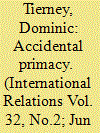

|
|
|
|
|
| Summary/Abstract |
Why did states fail to balance against the United States after the end of the Cold War? Scholars have neglected an important dynamic: the accidental nature of America’s rise to primacy. The United States became the sole superpower not by deliberately increasing its capabilities but due to the unexpected collapse of its rival, the USSR. The case illustrates that a state’s responsibility for its gains in power can vary significantly, with important consequences for subsequent balancing. Active or deliberate power increases tend to produce more balancing than passive power increases because they signal aggressive intentions, alter the dyadic power balance between the rising state and potential balancers, and trigger loss aversion.
|
|
|
|
|
|
|
|
|
|
|
|
|
|
|
|
| 2 |
ID:
071801
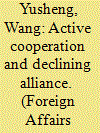

|
|
|
| 3 |
ID:
145702
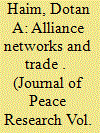

|
|
|
|
|
| Summary/Abstract |
How does the network of international political alliances influence trade flows? Previous work suggests that alliances matter in predicting trade outcomes because governments align trade policies with national security interests and firms take political relations between states into account when assessing risk. However, work to date investigates only the relationship between direct political alliances and trade, which ignores the complexity of international alliance structures. In this article, I argue that states and firms not only consider direct political relationships when shaping international trade, but also focus crucially on indirect alliance relationships. I find that higher levels of trade result when states have more shared alliances and when they are in the same alliance community. Once these indirect relationships are accounted for, the apparent association of dyadic alliances with trade is drastically reduced. Joint membership in an alliance community predicts an increase in trade that is more than twice the increase associated with a dyadic alliance. This effect is magnified when considering highly ‘central’ states in the alliance network. States trade significantly more with central states in their own alliance community and less with central states in other communities.
|
|
|
|
|
|
|
|
|
|
|
|
|
|
|
|
| 4 |
ID:
027419
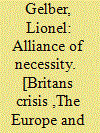

|
|
|
|
|
| Publication |
London, Robert Hale, 1967.
|
| Description |
192p.
|
|
|
|
|
|
|
|
|
|
|
|
Copies: C:1/I:0,R:0,Q:0
Circulation
| Accession# | Call# | Current Location | Status | Policy | Location |
| 000705 | 327.116/GEL 000705 | Main | On Shelf | General | |
|
|
|
|
| 5 |
ID:
183409
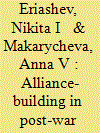

|
|
|
|
|
| Summary/Abstract |
Although great powers may forge ad hoc coalitions to attain their short-
term goals, this does not diminish the role of long-term strategic alliances.
The alliance theory has long become a separate strand of IR. However,
most scholars have focused more on external rather than internal threats
to account for alliance choices. The authors review the existing literature
on the formation of alliances and, shifting the focus to the struggle for
power between internal political actors, propose a theory that explains the formation of asymmetric alliances. By extending support to friendly
political groups, great powers can build alliances with those countries
where the elites are facing formidable opponents. On the contrary, leaders
who rule unchallenged have little incentive to rely on external patrons.
The article examines the cases of postwar Italy and Yugoslavia to test
the proposed hypotheses. The conclusions drawn from the analysis help
formulate recommendations that can be used by Russia in its current
strategic environment.
|
|
|
|
|
|
|
|
|
|
|
|
|
|
|
|
| 6 |
ID:
040123
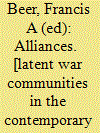

|
|
|
|
|
| Publication |
New York, Halt Rinehart and Winston, 1970.
|
| Description |
viii, 384p.
|
| Series |
Cases in international politics
|
| Standard Number |
030767601
|
|
|
|
|
|
|
|
|
|
|
|
Copies: C:1/I:0,R:0,Q:0
Circulation
| Accession# | Call# | Current Location | Status | Policy | Location |
| 005062 | 327.116/BEE 005062 | Main | On Shelf | General | |
|
|
|
|
| 7 |
ID:
039557
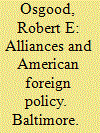

|
|
|
|
|
| Publication |
Baltimore, Johns Hopkins Press, 1968.
|
| Description |
x, 171p.
|
|
|
|
|
|
|
|
|
|
|
|
Copies: C:1/I:0,R:0,Q:0
Circulation
| Accession# | Call# | Current Location | Status | Policy | Location |
| 001149 | 347.116/OSG 001149 | Main | On Shelf | General | |
|
|
|
|
| 8 |
ID:
040124
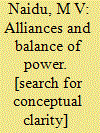

|
|
|
|
|
| Publication |
DelhI, Macmillan Company of India Ltd., 1974.
|
| Description |
xv, 306p.
|
|
|
|
|
|
|
|
|
|
|
|
Copies: C:1/I:0,R:0,Q:0
Circulation
| Accession# | Call# | Current Location | Status | Policy | Location |
| 013543 | 327.116/NAI 013543 | Main | On Shelf | General | |
|
|
|
|
| 9 |
ID:
163389
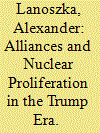

|
|
|
|
|
| Summary/Abstract |
Donald Trump appears to have intensified the danger of U.S. allies wanting their own nuclear weapons, but such concerns are exaggerated. U.S. alliances are more resilient than commonly presumed with actual force deployments, which don’t appear to be changing any time soon, mattering more than rhetoric to make security guarantees adequate for the foreseeable future.
|
|
|
|
|
|
|
|
|
|
|
|
|
|
|
|
| 10 |
ID:
113758
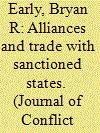

|
|
|
|
|
| Publication |
2012.
|
| Summary/Abstract |
What determines how US economic sanctions affect the international trade conducted with their targets? This article develops a liberal-based explanation for why economic sanctions increase their targets' trade with some third parties and decrease it with others. It is theorized that the effects of defense pact alliances between sender and third-party states are conditional upon the strength of the third parties' commercial dependence upon the target states. Third parties will cooperate with senders when the costs are low, but use their alliance relationships as cover to sanctions bust when the commercial benefits are high. This suggests that the United States can best gain the support of allies whose cooperation matters the least, while the allies whose support is most important tend to sanctions bust. It is also theorized that a target state's allies trade more with it than its nonallies. An empirical analysis of ninety-six episodes of US-imposed sanctions supports these hypotheses.
|
|
|
|
|
|
|
|
|
|
|
|
|
|
|
|
| 11 |
ID:
009740
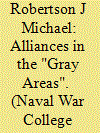

|
|
|
|
|
| Publication |
Autumn 1995.
|
| Description |
53-66
|
|
|
|
|
|
|
|
|
|
|
|
|
|
|
|
| 12 |
ID:
072699
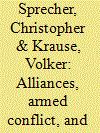

|
|
|
|
|
| Publication |
2006.
|
| Summary/Abstract |
Alliances are subject to many scholarly inquiries in international relations and peace research because they are major instruments of foreign and security policies. Since the early work on alliances produced by the Correlates of War (COW) project, there have been significant advances in conceptual, theoretical, and empirical alliance research. New typologies and data permit us to differentiate more thoroughly among a variety of alliance objectives and functions. Furthermore, there has been new theoretical and empirical research on alliance formation, alliance configuration/polarization, effects of alliances on military conflict, connections between alliances and trade, and the economics of alliances. Providing new theoretical approaches, data, and empirical evidence on alliances, this special issue includes articles that address alliance formation, alliance polarization, alliances and democratization, trade among allies, regional economic institutions with alliance obligations, and defense industrial policies of military alliances. The articles in this issue extend our understanding of alliances past the traditional realist balance-of-power framework and encourage further testing and refinement of older alliance arguments and extensions to new theoretical developments.
|
|
|
|
|
|
|
|
|
|
|
|
|
|
|
|
| 13 |
ID:
073977
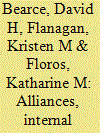

|
|
|
|
|
| Publication |
2006.
|
| Summary/Abstract |
We offer a theory explaining how alliances as international security regimes reduce military conflict between member-states through their internal provision of information concerning national military capabilities. Bargaining models of war have shown that a lack of information about relative military capabilities functions as an important cause of war. We argue that alliances provide such information to internal participants, and greater knowledge within the alliance about member-state military capabilities reduces certain informational problems that could potentially lead to war. This internal information effect, however, is a conditional one. We posit that the information provided within the alliance matters most for dyads at or near power parity: the cases where states are most uncertain about who would prevail if a military conflict did emerge. In power preponderant dyads where the outcome of a potential military conflict is relatively certain, the internal information provided by military alliances becomes less important. Our statistical results provide strong support for these theoretical arguments.
|
|
|
|
|
|
|
|
|
|
|
|
|
|
|
|
| 14 |
ID:
068736
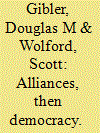

|
|
|
| 15 |
ID:
121789
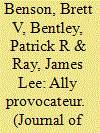

|
|
|
|
|
| Publication |
2013.
|
| Summary/Abstract |
The primary purpose of many alliances is to deter attacks on members of the alliance by potentially antagonistic states. Yet some alliances can increase the probability of conflict that may be initiated by alliance members. Cognizant of that possibility, states that wish to sustain peace may nevertheless intentionally form alliance commitments with revisionist leaders of other states. Faced with the partially conflicting goals of deterring antagonistic states while at the same time restraining allies, leaders often include in alliance treaties conditions that oblige allies to provide military assistance only if a member of the alliance is attacked by a state outside the alliance. However, other treaties may contain unconditional obligations to come to the defense of members of the alliance. Such alliances tend to arise from situations where some members of the alliance feel that their alliance partners need to have the flexibility even to engage in provocative behavior in order to deter the target of the alliance. Our analysis of alliance formation processes in the context of priorities that compete with each other provides a basis for two hypotheses. The first is that revisionist states with unconditional commitments from members of their alliance to come to their defense are more likely to initiate militarized conflict than states without such unconditional commitments. The second hypothesis is that revisionist states in alliances whose treaties stipulate that commitments to defend are conditional will be less likely to initiate militarized conflict than such states with allies who are committed to come to their defense without conditions. Statistical analyses of data generated with a view toward evaluations of both hypotheses (some of which provide new, more detailed categorizations of alliance treaties) suggest that they are valid.
|
|
|
|
|
|
|
|
|
|
|
|
|
|
|
|
| 16 |
ID:
128975
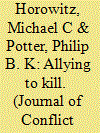

|
|
|
|
|
| Publication |
2014.
|
| Summary/Abstract |
Terrorist organizations do not operate in isolation. Instead, they forge alliances with one another, which generate a tight network of intergroup relationships. We argue that these relationships serve to increase group capacity, manifesting itself in the ability of a group to conduct deadly attacks. However, groups are notably judicious when they forge these cooperative ties, preferring to link to the strongest groups to which they have access. The result of this process of preferential attachment is a core/periphery structure in the broader network of alliances. Moreover, groups with ties to organizations at the core of the broader universe of relationships reap more rewards than those with large numbers of less meaningful alliances. Terrorism research and counterterrorism policy should assess terrorist organizations in the broader context of their interrelationships and depth of alliances rather than in isolation.
|
|
|
|
|
|
|
|
|
|
|
|
|
|
|
|
| 17 |
ID:
091496
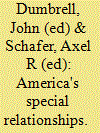

|
|
|
|
|
| Publication |
London, Routledge, 2009.
|
| Description |
ix, 250p.
|
| Standard Number |
9780415483766
|
|
|
|
|
|
|
|
|
|
|
|
Copies: C:1/I:0,R:0,Q:0
Circulation
| Accession# | Call# | Current Location | Status | Policy | Location |
| 054528 | 327.73/DUM 054528 | Main | On Shelf | General | |
|
|
|
|
| 18 |
ID:
176227
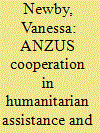

|
|
|
|
|
| Summary/Abstract |
This article discusses how the ANZUS states of United States, Australia, and New Zealand that sit on the fringes of the Asia-Pacific, are increasingly using their armed forces to deliver Humanitarian Aid and Disaster Response (HADR) as a way of engaging with the region. This is a neglected topic both in international relations and research on regional security in the Asia Pacific. This assessment reveals new developments in regional engagement between the ANZUS states and the Asia-Pacific. It finds that despite a shared language, broadly similar regional goals, and a need for interoperability; the ANZUS alliance itself does not appear to be driving closer military coordination on HADR. This article finds instead that HADR is being used to build new informal security networks that combine traditional and non-traditional security threats as a form of soft balancing against China.
|
|
|
|
|
|
|
|
|
|
|
|
|
|
|
|
| 19 |
ID:
169544
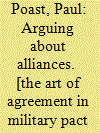

|
|
|
|
|
| Publication |
Ithaca, Cornell University Press, 2019.
|
| Description |
xi, 244p.: ill.,hbk
|
| Standard Number |
9781501740244
|
|
|
|
|
|
|
|
|
|
|
|
Copies: C:1/I:0,R:0,Q:0
Circulation
| Accession# | Call# | Current Location | Status | Policy | Location |
| 059771 | 327.1/POA 059771 | Main | On Shelf | General | |
|
|
|
|
| 20 |
ID:
190704
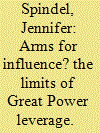

|
|
|
|
|
| Summary/Abstract |
Scholars and policymakers agree that major powers have leverage over their more junior partners. Giving security assistance or providing arms is supposed to increase this leverage. However, major powers often hit roadblocks when trying to influence the behaviour of their junior partners. This article demonstrates that junior partners are often successful in constraining the behaviour of the major power partners, and have particular success in extracting additional resources from their major partners. This article develops the concept of loyalty coercion to explain that leverage is based on rhetorical and symbolic moves, rather than material preponderance. It then uses cases of US arms sales to show that weapons transfers did not lead to US leverage, instead opened opportunities for junior partner influence. The article contributes to scholarly and policy perspectives on alliance management and reputation, and leverage in world politics.
|
|
|
|
|
|
|
|
|
|
|
|
|
|
|
|
|
|
|
|
|